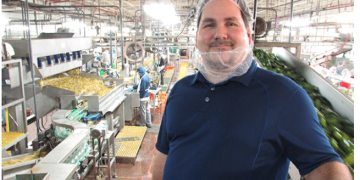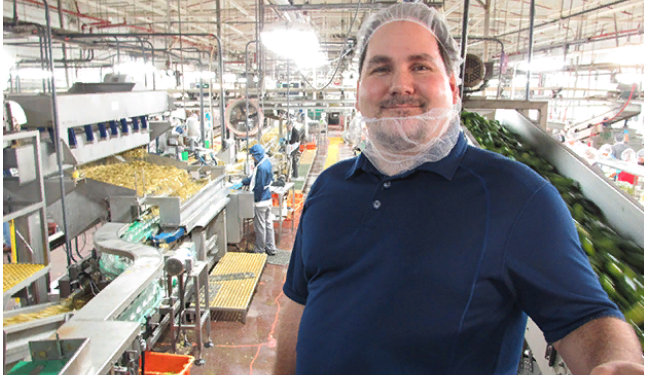The Mt. Olive Pickle Company is Mt. Olive, North Carolina.
Generations from the same families have and continue to work in the plant, which produces pickles, peppers and relishes in various flavors and configurations. You can’t go anywhere in town, population approximately 4,500, without running into someone who works at the company or knows a person who does.
“We’re not family owned in the sense that one family owns shares,” said Lynn Williams, a 16-year employee and public relations manager at Mt. Olive Pickle. “But there’s very much a family feel.”
The company lists its location as being on the corner of Cucumber and Vine.
“You don’t ever talk about anybody who works at Mt. Olive,” Williams jokes. “You don’t know who they might be kin to.”
Small Town, Big Business
Celebrating its 90th anniversary in 2016, Mt. Olive Pickle Company’s roots begin with a Lebanese immigrant and a sailor who had worked in a pickle plant. The area had an abundance of surplus cucumbers, and their plan was to buy and brine them to sell to other packers.
That idea fizzled when they didn’t find any buyers. Instead, local business people came together with 37 shareholders putting up the money, to start a pickle company they viewed as a “community proposition.”
In the late 1960s and early 1970s, the company cooperated with researchers from USDA’s Food Fermentation Lab at North Carolina State University, whose goal was to perfect the process of controlled fermentation – research that had industry-wide impact.
At one point, Williams said, there were a lot of smaller regional pickle companies. In the 1980s, many were bought and absorbed into larger corporations. Mt. Olive didn’t want that.
“We made a concerted effort to grow the business and remain independent,” she said. “And we’ve been successful in
doing that.”
The company is also clear in its mission.
“We are focused on what we do best,” Williams said. “We pack pickles, peppers and relishes, and that’s all we do.”
Today, Mt. Olive is the largest privately held pickle company in the United States. Operating on 117 acres, its facilities include about 900,000 square feet of manufacturing and warehouse space and a yard with 1,100 fiberglass tanks that can store more than 40 million pounds of cucumbers. It employs about 500 people year round, adding another 300 to 350 during the summer, when production is ramped up as large volumes of cucumbers are harvested.
“It’s kind of like winter production on steroids,” Williams said.
Mt. Olive doesn’t operate its own farms, but procures cucumbers from growers and suppliers mainly in Georgia, North Carolina, Maryland, Delaware, Ohio, Michigan, South Carolina, Texas, Florida, Canada, Mexico and India, depending on the time of year. It also looks to Greece for pepperoncini and Peru for roasted red peppers.
The company processes about 175 million pounds of peppers and cucumbers a year – that translates into some 14.5 million jars. Its largest demographic is families with children.
“We are consistently the second best- selling brand of pickles in the United States,” said Randy Sweigart, who is transitioning from his former position of plant manager to retirement after 20 years with the company. “We’re trying to beat Vlasic. We’ve beat them some quarters, but not consistently.
“We’ve really grown. And we’re still going to grow.”
Broadening the Base
The company has grown by expanding distribution and product lines.
“The category is fairly flat,” Sweigart said. “Pickles, peppers and relishes weren’t growing much. For us to grow, we had to take it from somebody else’s market share – from other pickle companies.
“Twenty years ago, we were in the middle Atlantic states. We weren’t in the Northeast, we weren’t in the Midwest. Now we’re in all 50 states.”
For 60 years, Mt. Olive had its own fleet of trucks delivering a portion of its products. The company discontinued that practice in 2009, when it became too cost prohibitive. Now they ship by common carrier, with some customers picking up orders themselves.
As part of the effort to diversify, in 2002 Mt. Olive introduced some pickles and relish that use artificial sweetener.
“Our production has increased dramatically. We’ve gotten to more different items with the Splenda, the no preservatives, no artificial coloring,” Sweigart said. “We’ve got sugar-sweetened products now – we just started doing that. Instead of corn syrup, we’re using sugar. And we have sea salt products.”
Mt. Olive also developed a way to make pickles more portable. It rolled out picklePAKs in 2007, later introducing pepperPAKs, delivering the goods in a four-pack of single-serving plastic cups.
“It’s kind of hard to haul a glass jar around in your lunchbox,” Williams said. Finding the right packaging and process for the cups took some trial
and error.
“The challenge has been the acidic nature of the product … and trying to make sure it would seal and work the way it should,” she said.
Sweigart said the sales department wanted to use foil, a seal that would offer surface for better graphics than plastic. The key to making it work, he adds, was ensuring that no moisture got on the rim to cause it to bubble, and then perfecting the heat-sealing process.
In addition, Mt. Olive packs some product for private-label customers – peppers, pickles and relishes sold at retail under the store label. The only exporting the company does is to U.S. military commissaries.
“We have a hard (enough) time supplying the United States,” Sweigart said.
A Strong Bond
Not only does Mt. Olive Pickle strive to be a good corporate citizen, its employees support the community. Besides providing volunteer support, employees can participate in a program that has them contributing 30 cents of each $100 in gross wages, which the company matches, to an Employee Community Fund. Through that effort, hundreds of thousands of dollars have gone to support local charities – $140,000 last year alone.
It’s all part of the bond that Production Superintendent Steve Whitman said the company has with the community. And he knows it well. Whitman hired in as a supervisor trainee when he was 18, 32 years ago. His father also worked for Mt. Olive, retiring 15 years ago.
“I don’t know who eats all these pickles,” he said. “But I’m sure glad they do.”






























